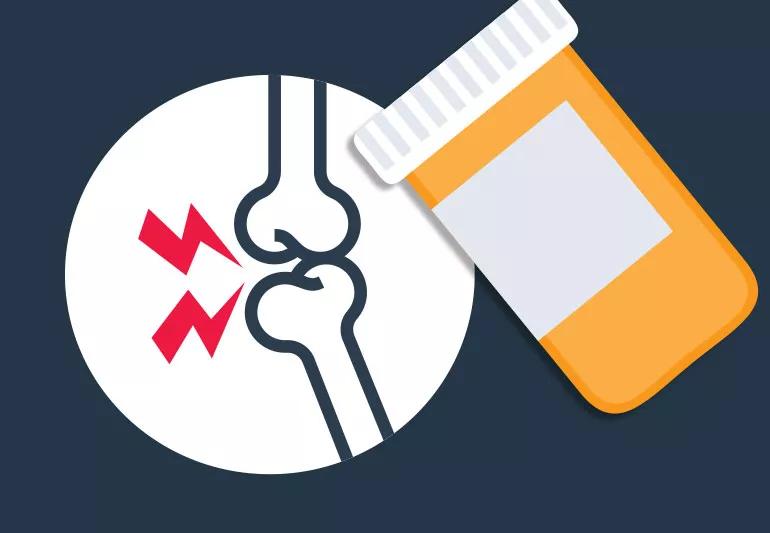New class of medications for RA has a unique effect on the immune system

Image content: This image is available to view online.
View image online (https://assets.clevelandclinic.org/transform/d9052d0f-c147-4df0-9d43-cce1a07f2cc9/JAKinhibitor-1144830898-770x553-1_jpg)
Rheumatoid arthritis and JAK medication
If methotrexate — the first drug doctors usually prescribe for rheumatoid arthritis — stops working for you, or you can’t tolerate it, there are a growing number of options. Thankfully, a wide range of medications can slow down the process that leads to joint damage. And as a result, most people with rheumatoid arthritis can be spared the worst effects of the disease.
Advertisement
Cleveland Clinic is a non-profit academic medical center. Advertising on our site helps support our mission. We do not endorse non-Cleveland Clinic products or services. Policy
These drugs fall into categories based on how they affect the immune system. “The newest drugs, called janus kinase (JAK) inhibitors, represent a new drug category because of the unique way they work,” says rheumatologist Matthew Bunyard, MD.
Autoimmune diseases, including rheumatoid arthritis, occur because of a malfunctioning immune system. The immune system, which protects us from disease and helps heal injuries, goes awry and attacks healthy tissue. In the case of rheumatoid arthritis, the attack primarily targets the lining of joints (called the synovium).
Drugs for rheumatoid arthritis work by blocking parts of the immune system from wreaking havoc. Most people with rheumatoid arthritis start with the disease-modifying anti-rheumatic drug (DMARD) methotrexate, usually taken as a pill (but is also available as an injection). It has a proven track record as an effective medication. There are other DMARDs as well. But methotrexate doesn’t work well enough for everyone, and some people have side effects.
The next step is to add or switch to another drug. The decision will be based on a discussion with your rheumatologist. Traditionally, the second drug has been a biologic DMARD. Most of these engineered drugs block chemicals (called cytokines) that are outside cells and promote inflammation.
Advertisement
Commonly used biologics block a cytokine called tumor necrosis factor, or TNF. Others target different cytokines (Il-6, IL-7) and cells (B-cells or T-cells) of the immune system.
There’s also another option: The newest drugs, the JAK inhibitors (AKA jakinibs), inhibit inflammation from inside cells. They block enzymes (JAK1, JAK2 and JAK3) that play a role in sending signals along a pathway that initiates an inflammatory process.
The first JAK inhibitor, tofacitinib (Xeljanz ®), became available in 2012. It can be used for both psoriatic arthritis and rheumatoid arthritis. A second one, baricitinib (Olumiant®) was FDA-approved in 2018 for rheumatoid arthritis only. Several others are being tested in clinical trials.
JAK inhibitors have the advantage of being taken as pills, whereas biologic drugs are given as either an injection or infusion.
“If you have an adverse reaction to methotrexate, you could be taken off that and given a JAK inhibitor,” Dr. Bunyard says. For people who tolerate methotrexate but have only a partial response (it doesn’t fully work for them), a JAK inhibitor might be added.
“A JAK inhibitor can be taken along with methotrexate, but it cannot be taken with a biologic drug,” Dr. Bunyard says.
Studies have shown that adding a JAK inhibitor to methotrexate is equally effective as adding a biologic to methotrexate.
All of the drugs used for rheumatoid arthritis have potential side effects, including the JAK inhibitors. Because the drugs suppress parts of the immune system, there’s an increased risk for infections and some cancers. The risk is low. Nonetheless, precautions should be taken.
Before starting these medications, you’ll be tested for tuberculosis. Vaccinations against pneumonia, influenza, shingles and hepatitis are recommended.
This article originally appeared in Cleveland Clinic Arthritis Advisor.
Advertisement

Sign up for our Health Essentials emails for expert guidance on nutrition, fitness, sleep, skin care and more.
Learn more about our editorial process.
Advertisement
Say yes to whole foods, lots of fruits and vegetables, and anti-inflammatory antioxidants
Having well-controlled RA at the time of conception is the key to keeping it under control while you’re pregnant
Sleep, diet and exercise can help
It’s not uncommon for individuals with RA to also have the blood disorder
The autoimmune disease can be managed with lifestyle changes and medication
Plus, treatment options for relief
Diet and exercise are your best first steps
What’s the difference between these types of inflammatory arthritis?
Type 2 diabetes isn’t inevitable with these dietary changes
Applying a hot or cold compress can help with pain
Pump up your iron intake with foods like tuna, tofu and turkey